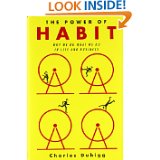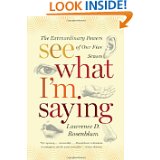What’s Going On in Your Brain
September 21, 2012
I finished more books on the brain over the last few weeks. Actually I finished three, but my friends tell me one doesn’t count. You can decide for yourself.
I won’t pretend to give them all thorough reviews, but I will make a brief comment on each. I think they are all worth reading of you want some insight into what’s going on in your mind as you wander through life.
Charles Duhigg’s “The Power of Habit,” was interesting for the first 125 pages (out of 290). He does a great job explaining how habits develop, but he leaves the specifics about what to do about it until the appendix. He offers a general theory and solution but he stops just short of a full answer. He uses his own habit as an example of how to break a habit. For my money that’s why people buy the book. A good part of the rest of the book was really marketing advice, and while it was interesting, I’m not sure it was ‘on point,’ as they say.
Lawrence Rosenblum’s “See What I’m Saying,” is a great look at neuroplasticity – the brain’s capacity to expand the functionality in one area, to make up for deficits in others. Rosenblum is a psychologist and researcher, not a writer, so his style is exactly the opposite of Duhigg. Where Duhigg is light and easy to read, Rosenblum can be a bit more theoritical or professorial. There’s nothing wrong with it, but you have to work much harder to find the nuggets. But his explanation of how hearing makes up for lost eyesight, or how touch and taste and smell can evolve, to help out when other senses are lost is fascinating.
Where Duhigg is light and easy to read, Rosenblum can be a bit more theoritical or professorial. There’s nothing wrong with it, but you have to work much harder to find the nuggets. But his explanation of how hearing makes up for lost eyesight, or how touch and taste and smell can evolve, to help out when other senses are lost is fascinating.
I also recently read Jonah Lehrer’s “Imagine,” and while I don’t condone his creative quotes from Bob Dylan, he does make some interesting points about the creative process. A good friend of mine told me , “you can never know what he’s making up.” Which is is quite valid – particularly for a journalist.  Maybe I’m just reflecting my own cognitive dissonance -believing what I want to believe – but I don’t think anyone could conjure all the situations and theories he presents out of nothing. In that vein, I’ve decided not to ask Amazon for my money back, even though they offered.
Maybe I’m just reflecting my own cognitive dissonance -believing what I want to believe – but I don’t think anyone could conjure all the situations and theories he presents out of nothing. In that vein, I’ve decided not to ask Amazon for my money back, even though they offered.
Thinking About the Brain and Pain
March 8, 2011
I’ve been doing a lot of thinking about the brain recently. If you’ve read any of my book review posts you know I have an interest in how the brain works and what makes us, us.
But, over the last three weeks there seems to be a convergence of sorts. Two weeks ago the Wisdom 2.0 Conference was held in Mountain View. Billed as conference seeking “deeper meaning” in the modern technology-rich age, the event focused on mindfulness and trying to get participants to ‘be’ present, rather than always looking to something in the future.
The speakers were among the biggest in the field. If you are not knowledgeable in the field, trust me, those in the know, such as my wife, told me the people on stage were the thought leaders. What was more interesting to me was the attendees – well over half the crowd was made up of coaches of one type or another.
There were a few physicians, a couple of psychologists and many practitioners of mindfulness, or meditation of other holistic practices, but the largest group seemed to be coaches.
A key focus of the event was the effect of mindfulness on the brain and the enhancement of cognitive abilities.
Around the same time several articles came out noting the impact of the brain on pain.
One of them suggested that a patient’s expectations would impact their pain level and that the expected outcome of a surgical procedure was affected by a patient’s psychological state. My wife, the pain psychologist, has been telling me this for years.
Then, last week I attended a meeting of the Northern California Association of Pain Psychologists to listen to a lecture by Dr. Sean Mackey of Stanford on what happens in the brain when we experience pain. I had recently finished Melanie Thernstrom’s “Pain Chronicles” which I found quite compelling so I thought lecture would be interesting. Plus my wife didn’t want to drive alone.
Dr. Mackey is head of the Stanford pain program and is known world wide for the studies they do trying to isolate how the bran processes pain and other emotions.
Finally, I was brought full circle back to the Wisdom 2.0 coference by a New York Review of Books article on V.S. Ramachandran’s The Tell-Tale Brain: A Neuroscientist’s Quest for What Makes Us Human , which asks the question: If we know how the brain works does that really help us understand the human mind? And further, what implications does this have for coaching, management, or psychology.
I’m not sure what all this means but it seems clear the topic is pretty hot.
Think about it and let me know what you think.
Test Your ‘Face Reading’ Skills
For many folks, emotional intelligence equates to empathy. In reality it is much more. But empathy is an important component. And part of empathy is the ability to ‘read’ the expressions of others.
Neuro-scientists tell us that we have specific neurons which allow us to look at someone and understand what they are feelings. Peop0le who can do this well, according to the scientists, have more of these neural endings and are more empathetic.
Perhaps the most interesting part of the research is that it is cross cultural. In other words, regardless of your ethnic background, the emotions displayed by the human face are the same in say, the United States, Japan, China, or the Middle East. Happiness, for example, has a universal set of facial characteristics.
If you want to test your skill the Center for Greater Good at University of California at Berkeley, has put out a new little quiz. Take a minute or two and see how you do. Then drop me a note and tell me if you think it was accurate. But remember, another component of Emotional Intelligence is self awareness – the ability to look at yourself objectively.
As the center says, you can improve your score over time with practice. Your ability to read the faces of others can come in handy in any situation where you deal with another human being. Which is just about all day, every day.
